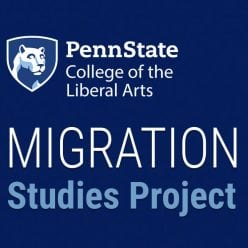Age of Migration
This is called the “Age of Migration.” The flow of people across traditional social and geographical boundaries has altered the global landscape. These flows have generated new challenges for the organization of social life and raised complex questions for policy makers. To address these concerns, scholars are compelled to move out of traditional paradigms and disciplinary boundaries to analyze the multifaceted and interlinked nature of migratory processes. The Migration Studies Project brings together faculty from diverse academic disciplines at Penn State University to collaboratively construct explanatory models that unravel the linkages between and among migratory processes across social and geographical domains.
This interdisciplinary center grew out of proposals from members of the university community who wish to study migration as a significant emerging social phenomenon. Accordingly, the Dean of the College of the Liberal Arts identified the possibility of an “Immigration Initiative” in her directive to the heads of departments for their strategic plans for academic years 2008-2013. In May 2008, the center was established with the objective of introducing the salient issues of migration to the university community and gathering together a group of scholars who will guide this initiative. The activities of the center currently bring together graduate students and faculty from the following five colleges in the University: Liberal Arts, Education, Health and Human Development, Art and Architecture, and the School of International Affairs. The monthly lunch hour seminar provides a forum for faculty from diverse departments to share their scholarship on migration with colleagues from other departments. The distinguished lecture series brings scholars of international repute to the university to share their knowledge on migration with the Penn State community. The center collaborates with other university institutes in holding events that promote an awareness of multiculturalism, language diversity, and transnational relations.
The center has developed a special research focus on the study of professional migration, knowledge transfer, and development. Skilled migration has attracted significant attention in the circles of development studies and globalization. Those who migrate from the global South for reasons of higher education and professional training are contributing to the development of their home communities in diverse ways. They send back remittances; they share their skills and knowledge to help education and industrial development; they outsource work from the North to companies in their home communities; and they provide consultation free of charge for new initiatives. From this perspective, their migration doesn’t lead to brain drain from the South as previously assumed, but brain gain for both the North and the South, and brain circulation around the world. The projects led by the center address the circulation of knowledge through skilled migration, and the role of English language in facilitating the transfer of skills and knowledge. The projects involve qualitative research by multidisciplinary faculty in multiple locations to track the experiences of sending and receiving countries. The center is currently spear heading research on skilled migration with member institutions of the Worldwide Universities Network. The following universities are represented by leading scholars who are studying migration: Bergen (Norway), Bristol (UK), Cape Town (South Africa), Leeds (UK), Sydney (Australia), York (UK), and the Universities of Washington at Seattle and Wisconsin at Madison in the US. In addition to fieldwork in their own locations, project team members have been meeting at Penn State to analyze their data, plan collaborative publications, and develop grant proposals.
The Migration Studies Project was supported by an Institute for the Arts and Humanities Interdisciplinary Project grant, 2009-11.

